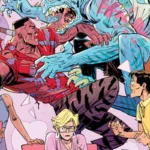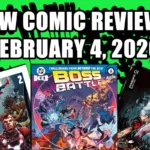One of the most divisive moments in modern superhero cinema is when Superman (Henry Cavill) snaps Zod’s (Michael Shannon) neck in the climax of Man of Steel. Love it, hate it, whatever your feelings on the moment, it caused a fracture in fandoms that they’ll perhaps never recover from. And while James Gunn’s Superman on the surface would seem to be tonally and textually different, in the middle of the Silver Age-inspired goofiness, there are moments when the film draws surprisingly close to that fractious scene in the prior movie.
Spoilers for Superman past this point. In the movie, while Superman (David Corenswet) saves everyone he can, down to and including a squirrel, there are also multiple characters he does not save. The first among them is the massive kaiju that attacks Metropolis halfway through the film. While the Justice Gang pummels the monster, Superman tries to contain the collateral damage – which is fine. But after telling Mr. Terrific (Edi Gathegi) that he’s been trying to save the monster as well as the city, Superman watches, mostly annoyed, while the other hero sends his T-Spheres inside the beast, detonating them and killing it instantly. Superman, meanwhile, gives an “oh, come on,” and helps lower the dead body to the ground.
Green Lantern (Nathan Fillion) offers up “kaiju steaks,” but Superman laments that he was hoping they could bring the monster to an “intergalactic zoo” or at least euthanize him painlessly instead of blowing up his insides. But the Man of Steel also quickly moves on to hugging kids and other matters. Sure, that’s a massive monster likely created in a lab by Lex Luthor (Nicholas Hoult), but Superman pivots pretty quickly from his moral stance in the scene.
Then there’s the biggest, most shocking death in the movie. Held captive by Luthor in an extra-dimensional prison, and nearly dead thanks to kryptonite created by Metamorpho (Anthony Carrigan), Supes watches helplessly as Luthor plays Russian Roulette with Malik “Mali” Ali (Dinesh Thyagarajan), a falafel vendor who gave Superman free food one time, then helped him out of a hole earlier in the movie. And Luthor cavalierly murders the man in front of Superman, something Supes is unable to stop – and what drives Metamorpho to help Superman escape, immediately after Luthor leaves.

The issue with the Malik murder is, yes, it’s there for a reason in the script. At least two, actually. First, to show us Luthor is unrepentently evil. Second, to drive Metamorpho to action. But it’s a moment in a script, which was written by James Gunn. Similar to the neck-snapping in Man of Steel, you can argue that Superman had no choice in either scene… But it was a choice made by the scriptwriter to, in the former case, make Superman unable to stop a murder; and in the latter, to drive Superman to kill. They’re different actions (or inactions, as the case may be), but they are a choice that could have been avoided in the writing phase because – sorry – none of this is real.
But the have your cake and eat it too moment comes when Superman isn’t even there. As Superman is in Metropolis fighting Ultraman*, the Justice Gang heads to the Boravia-Jarhanpur border to stop the Boravian invasion of the latter nation. While Green Lantern and Metamorpho destroy a bunch of tanks and soldiers, Hawkgirl (Isabela Merced) flies to the Boravian capital and picks up their leader, President Vasil Ghurkos (Zlatko Burić), and flies him over the city. He laughs, saying that she’ll never hurt him, Superman would never do that. “I’m not Superman,” she says, and drops him to his death.
(*For anyone who might note “hey, doesn’t Superman kill Ultraman?” they explicitly state earlier on that getting stuck in a black hole means you’ll never escape, not that you’ll die. Ultraman lives to fight another day.)
Here’s the thing: yes, Hawkgirl is not Superman. But Hawkgirl killing Ghurkos pays off in a weird and uncomfortable way on the conversation Superman and Lois Lane (Rachel Brosnahan) had earlier in the movie. In that, Superman explained that he flew Ghurkos to the desert and stuck him on a cactus, then explained that if he didn’t stop hurting people, they would have a more serious conversation. Lois calls the cactus torture, and questions what exactly Superman means by a more serious conversation. We know, and likely even Lois knows, that the naive Superman doesn’t mean to torture a man, and his more serious conversation is just that: a more serious conversation. But we get that escalation anyway from Hawkgirl, while Superman is busy elsewhere.
The issue is that either Superman saves everyone and everything; or he doesn’t. Is it fantasy to imagine there were zero deaths in the destruction of Metropolis in the climax of the movie, or even in the kaiju battle? For sure. But I’ll remind you what I said earlier: none of this is real. The fiction is that Superman pushes himself as hard as he can, and saves everyone he can at all times. Instead, in Gunn’s vision, he tries hard but misses now and again, and that’s okay. The kaiju died, and that’s a bummer, but it gets nary an additional mention (who cleaned up that corpse?). Malik makes the front page news, but past the initial shock of his death, Superman doesn’t seem particularly phased by his passing. And Ghurkos getting murdered by a hero who was ostensibly inspired by Superman doesn’t even merit a sidebar on the Daily Planet, nor a follow-up conversation between Lois and Clark.
Though a fun, viral video on a press tour is far from an official statement on the matter, rather than a mistake on the movie’s part, this seems to be Gunn’s general view on Superman as a whole. While answering the 50 most Googled questions about Superman for Wired, including “why doesn’t Superman kill?” Gunn explained that, yes, sometimes Superman kills.
“He believes in a basic right to life,” Gunn said. “I mean, I think that’s just not in him. But, I also don’t… I’m not a purist in that respect. I think that if, for instance, he had to kill to protect somebody’s life, he would probably do that, even though that would be hard for him.”
Is that really that far off from that divisive moment in Man of Steel? Not really. And while Superman doesn’t snap a villain’s neck in the new movie, and Gunn never puts Superman in a position to kill Lex Luthor or allow other people to be killed, it skirts the idea that maybe it could happen, someday, in a future movie or TV show. And consequently, there’s plenty of death to feed the bloodthirsty film-going audience, between the scenes of Superman eating cereal or saying “ah, jeez.”
Personally? No thanks. We all have our own view of Superman, who he is, and what he represents. For me, it is the fiction that he saves everyone, all the time. There are plenty of films, TV shows, books, etc that represent real moral quandaries, or even a more “realistic” view of superheroes. But Superman is the ideal. He can earnestly rise above any situation and figure out the best outcome, even when the odds seem impossible. That was true in Man of Steel, which dared to ask “what would you do in this situation,” when it should have shown us what Superman would do in the situation. And it’s true of Superman, where Kal-El is supposed to be inspiring the heroes around him to be better, but doesn’t seem to do anything in the situations mentioned above to do so. In all three instances, Superman stands by and lets the misdeeds happen – any decisions the other characters make are their own, rather than a specific inspiration Superman provides.
The excuse with Man of Steel was that he was a precocious 33-year-old baby man who was just learning how to use his powers and how to be good. In Superman, he is also a precocious 33-year-old baby man who is just learning how to use his powers and how to be good. Here’s hoping that in his next iteration, the man behind the curtain – whether he or she be James Gunn or otherwise – allows Superman to be something more than a man who kills when necessary, because that’s what “we” would do. Superman is not us, and we are not Superman. He’s the hope of what we could be, if we just strived for something more.
Listen to Sons Of A Gunn:
Discover more from Comic Book Club
Subscribe to get the latest posts sent to your email.












So your arguments are…Superman is just as morally grey as MoS Superman cause he is upset because Mr. Terrific kills that Kaiju monster but he’s more concerned the kids are okay and not hurt, that he couldn’t prevent a murder because he was actively being weakened by kryptonite, and because Hawkgirl (who explicitly states that she is not Superman) kills a dictator when Superman isn’t there.
Also Ultraman is a brainless clone of Superman so while the Kaiju monster was possibly created by Luthor in a lab, Ultraman definitely was.
Nope, that’s not the argument I’m making!